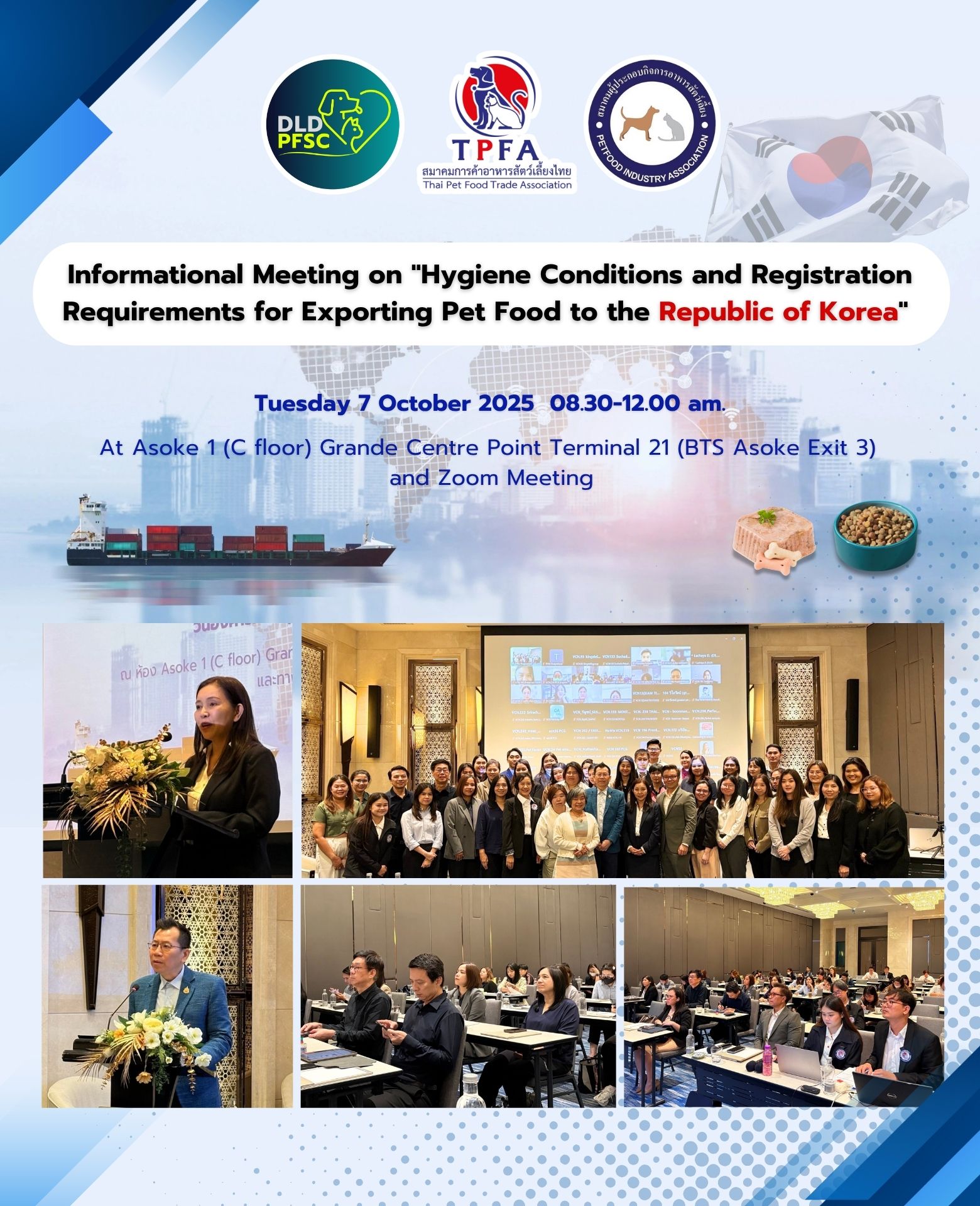
Informational meeting on "Conditions for Pet Food Hygiene and Registration Requirements for Pet Food Manufacturers Exporting to the Republic of Korea"
October 7, 2025
The Thai Pet Food Association (TPFA), in collaboration with the Pet Food Promotion Center, the Animal and Veterinary Medicines Control Division of the Department of Livestock Development (DLD), and the Pet Industry Association (PIA), organized an informational meeting on “Conditions for Pet Food Hygiene and Registration Requirements for Pet Food Manufacturers Exporting to the Republic of Korea” at ASOKE1, Grande Centre Point Terminal 21 Hotel in Bangkok, as well as online. There were 45 on-site attendees (TPFA led by Mr. Kriangchai, Chairman of the Technical Committee; Ms. Chutima, Technical Committee; and Ms. Supattra, Director) and 100 online participants. The meeting was chaired by Dr. Sudarat, Director of the Animal and Plant Quarantine Agency (APQA), with Dr. Udom, Director of the Pet Food Promotion Center, providing the report. The main points discussed are summarized below.
Objective
The purpose of the meeting was to raise awareness and understanding of the hygiene conditions related to pet food, as well as the registration process for pet food manufacturing facilities exporting to the Republic of Korea. The event also served as a platform for exchanging information, ensuring all stakeholders have a unified understanding and can proceed correctly according to the requirements of the Animal and Plant Quarantine Agency (APQA) of South Korea. This initiative aims to support the continued export of Thai pet food to the Republic of Korea.
Background
In early 2025, the Republic of Korea updated its conditions for importing pet food. A new requirement was introduced that all pet food manufacturers intending to export to Korea must be officially registered. This is a condition that has not been previously enforced. The Animal and Veterinary Medicines Control Division provided the following clarifications:
1. Hygiene Conditions for Pet Food and Registration of Manufacturing Facilities for Export to the Republic of Korea
South Korea’s MAFRA Notification No. 2025-20 requires that pet food imports must be finished products made from animal-derived ingredients (excluding pasteurized dairy products, sterilized eggs, cured skins, flavoring fats, or personal items). Raw materials must come from countries approved by the veterinary authorities and must pass veterinary inspection. If imports are from restricted areas, they must undergo sterilization, such as pork meat ≥70°C for 30 minutes, poultry ≥56°C for 30 minutes, or canned/retort/air-dried products.
Manufacturing facilities must be approved by the South Korean government, must not be located in disease outbreak zones, and must keep production records for at least 2 years. Products must be labeled with product name, factory, and ingredients. Failure to comply could result in suspension or revocation of approval, including cases where there has been no export for 3 years. Registration documents include an application for quarantine facility approval, factory inspection forms, and other required supporting documents. A grace period has been granted until December 31, 2025.
2. Issuance of Pet Food Hygiene Certificates for Export to the Republic of Korea
Thailand has adjusted the Health Certificate format (effective October 2025) to align with the new South Korean requirements. The certificate must state that raw materials meet MAFRA’s approval, that animals are inspected before slaughter, and that the products are produced and exported from Thailand following contamination prevention measures. The certificate must include product details, sterilization methods, transport information, and health conditions, such as heat treatment for pork meat (≥70°C for 30 minutes) and pasteurized egg products according to specified temperature-time requirements. Canned/retort products must also be sterilized.
Moreover, it is necessary to confirm that the manufacturing facility has passed inspections from both the Thai Department of Livestock Development and South Korean authorities, keeps production records for at least 2 years, and agrees to re-inspections if non-compliance is found.
Clarifications by the Speakers
All pet food manufacturing facilities can continue exporting to South Korea without registration until December 31, 2025, and may still use the existing Health Certificate form for exports. After this date, the new Health Certificate format will be implemented in accordance with South Korean regulations. However, if there are uncertainties about the specifics by October 2025, the Thai authorities will request an extension through the Department of Livestock Development. This issue is similar to challenges faced by other countries.
Further Discussions
Dr. Sudarat, Director of APQA, emphasized the need for the associations to engage with manufacturers to address concerns regarding “delays in registration.” She noted that the registration process for Category 03 has significantly improved, but Categories 01 and 02 are still experiencing delays due to the large volume of requests and the careful verification required. The pet food market is growing rapidly, now ranking as the second-largest in the world, leading to increased demand for registrations. The Director suggested seeking private sector proposals on how to resolve this issue, with potential government support. The Department of Fisheries has already started addressing these concerns, such as hiring additional staff (currently in the recruitment process) and deploying inspection teams twice a month to facilitate manufacturers.
Next Steps
The association will survey its members to gather issues and suggestions, which will be used to inform discussions with the Department of Livestock Development moving forward.
